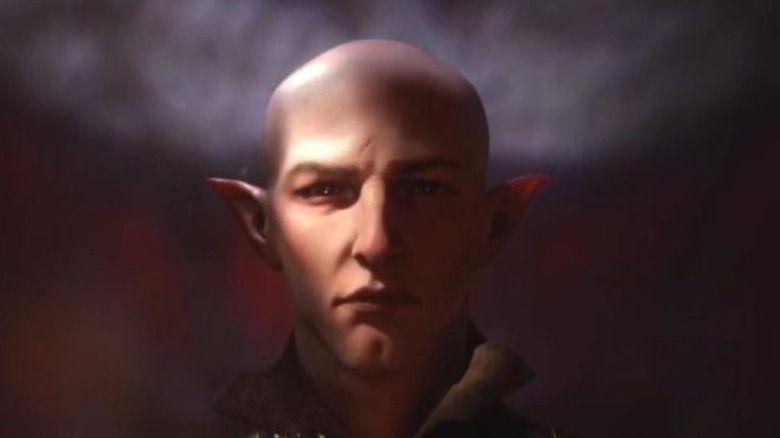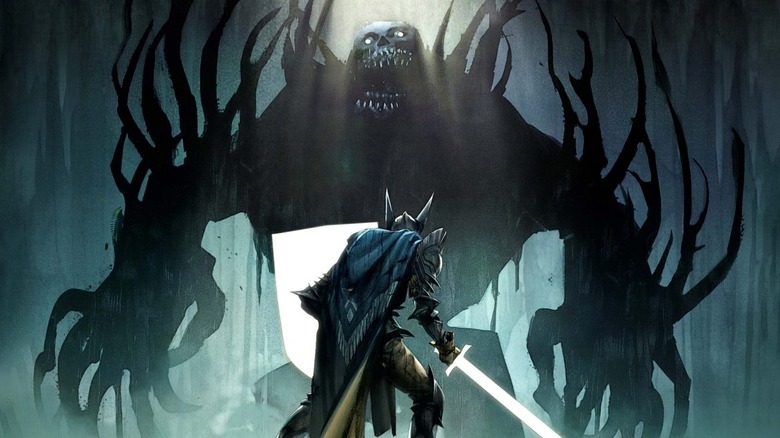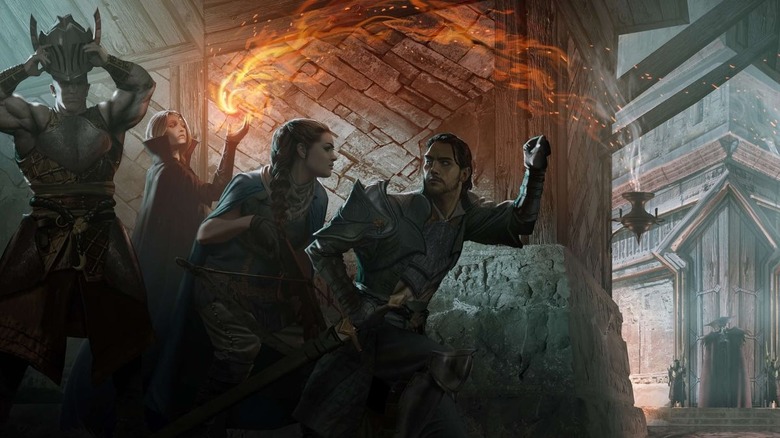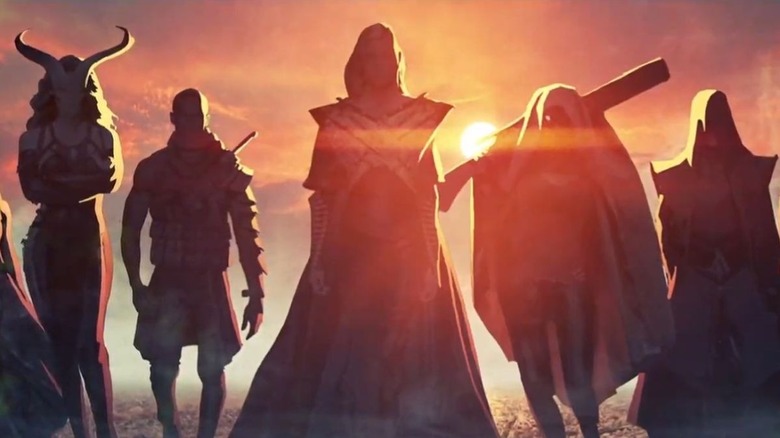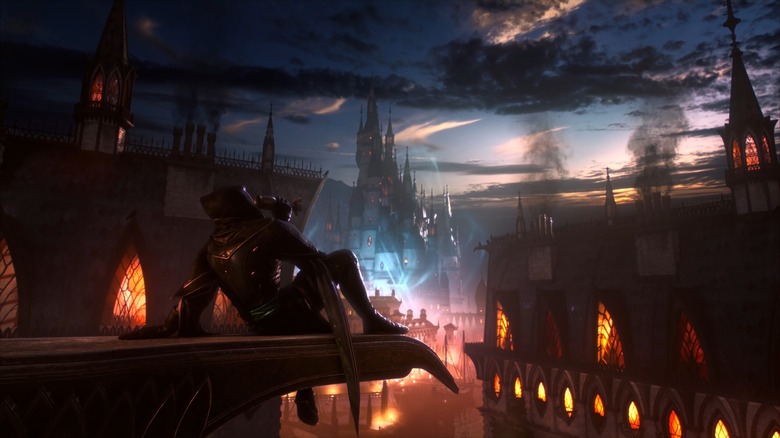Dragon Age 4: When Will We Get A Sequel?
The "Dragon Age" series has long occupied a place of prominence in the RPG genre. Established in 2009 through the launch of the highly esteemed "Dragon Age: Origins," the franchise saw two more mainline entries and a wealth of DLC, culminating with the final "Inquisition" expansion, "Trespasser," in late 2015. "Trespasser" ended on a rather epic cliffhanger, leaving fans eager for the next installment — a wait that seemingly has no end in sight.
Over six years have passed since "Dragon Age: Inquisition" debuted in November 2014, offering a massive, fantasy playground to explore. Though diehards have wrung hundreds of hours of playtime out of the title, the community has long hungered for new "Dragon Age" content to sink its teeth into. Given half a decade has already sped by, you might assume the wait has almost reached its end. Surely BioWare and Electronic Arts will deliver the sequel fans have dreamt of sooner rather than later.
EA has at least confirmed that BioWare has the next "Dragon Age" game in the works. Whether it will be called "Dragon Age 4" or take on another designation remains up in the air, but it is happening. While followers have managed to piece together a number of details regarding its characters and setting, perhaps the most crucial question remains unanswered: when will it release? The teams behind the game may not be ready to drop that bombshell just yet, but a look at the development history of "Dragon Age 4" yields several clues about when prospective players can expect to get their hands on it.
BioWare began working on Dragon Age 4 in 2015 but EA canceled the project in 2017
"Dragon Age 4" has experienced several setbacks, to the point that it once looked like the "Inquisition" followup might never release at all. Based on a report from Kotaku, BioWare started working on the fourth instalment in 2015 following the launch of "Trespasser." Though some of the "Inquisition" team transferred to "Mass Effect: Andromeda," series creators Mike Laidlaw and Mark Darrah forged ahead with a smaller group of developers. The group made some progress, outlining the core details, tools, and production timeline needed to create a new entry set in the Tevinter Imperium.
Despite the advancement of the project, codenamed "Joplin," and the excitement that surrounded it, EA reportedly hit the pause button in 2016, pulling everyone to work on "Mass Effect: Andromeda." After "Andromeda" launched in 2017, the developers briefly returned to "Joplin," only to have EA cancel it outright in an attempt to rescue BioWare's doomed "Anthem." This shift resulted in the departure of several key individuals, a list that included Laidlaw, who had spent 14 years at BioWare.
Though EA rebooted "Dragon Age 4" by early 2018 with the codename "Morrison," Kotaku revealed that the new version would include live-service elements and "be built on Anthem's tools and codebase." This marked a significant departure from the franchise's single-player, story rich format. Given the different angle, it's possible that much of what the original team had planned for "Joplin" ended up in the trash bin to accommodate EA's emphasis on long-term gameplay and profit.
Dragon Age 4 took more losses after its reveal in late 2018
EA and BioWare revealed the next "Dragon Age" with a one-minute teaser trailer that featured during the 2018 Game Awards. Though the clip didn't divulge much, it indicated that the infamous "Inquisition" companion-turned-antagonist Solas, a.k.a. the Dread Wolf, would play a major role in the sequel. While some fans were excited by the prospect of resolving the big cliffhanger from "Trespasser," the lack of gameplay or concrete information left others concerned. Around nine months later, the project took another significant blow.
On August 17, 2019, "Dragon Age 4" lead producer Fernando Melo left BioWare after 12 years with the company. Though his parting email asserted that he had left "Morrison" in the hands of a "great game leadership team," it seemed the game had pushed yet another key player at BioWare to seek new opportunities. The concerning trend continued at the end of 2020 with the dual departure of general manager Casey Hudson and executive producer Mark Darrah. Darrah spent 23 years at BioWare and Hudson nearly broke the 20-year mark.
Without the major influences of Laidlaw, Darrah, and others, it fell to creative director Matthew Goldman and lead writer Patrick Weekes to keep the "Dragon Age 4" torch burning. Both have considerable history with BioWare and the "Dragon Age" series, though it's hard to imagine that the loss of so many key individuals has not hindered the sequel's development. It's little wonder that an August 2020 behind the scenes look revealed that the project was still in "early production."
Anthem's failure may have a significant effect on Dragon Age 4 and its launch date
It's no secret that BioWare's online multiplayer action RPG "Anthem" bombed, a disaster that some thought spelled the end of the studio. Though the developers committed to delivering an overhaul tentatively titled "Anthem 2.0," BioWare pulled the plug near the start of 2021. With these redevelopment efforts ended, the company moved its focus and resources to other projects, doubling down on the next "Dragon Age" in particular.
Hot on the heels of the "Anthem 2.0" cancelation, a report from Bloomberg revealed just how significant this shift could be. Based on alleged insider information, BioWare had designed the next "Dragon Age" installment with a major multiplayer component to fit EA's games as a service business model. However, the success of single-player action-adventure "Star Wars Jedi: Fallen Order" and the dismal returns of "Anthem" reportedly caused EA to change its tune. It seems BioWare received the greenlight to go all in on "Dragon Age 4," absorbing all of the developers previously assigned to "Anthem 2.0" and axing the multiplayer aspect to focus on a single-player narrative.
While the news, if true, marked a significant win for "Dragon Age" fans jaded by EA's love of microtransactions and online features, it may mean they will have to wait even longer to play the next game.
Dragon Age 4 likely has years of development ahead of it
Back in October 2019, EA CFO Blake Jorgensen stated (via GameSpot) during an earnings call that "Dragon Age 4" would not release until April 2022 at the earliest. While the project supposedly has received more manpower, the shift from multiplayer to a single-player focus could negate much of the work the developers have already completed. Similar to the cancelation of "Joplin," that might result in the loss of months of progress.
Based on an interview with Mike Laidlaw, "Dragon Age: Inquisition" spent about a year in the early concept stage and another three years in production. Given the sequel's early production status in late 2020 and the possible need for significant redesigns, it's reasonable to guess that "Dragon Age 4" won't launch for two to three more years. Whole storylines or characters might need to be overhauled to accommodate the new format, though the team could reincorporate aspects originally created for "Joplin."
"Joplin" reportedly focused on a team of spies in the Tevinter Imperium, placed a strong emphasis on player choice, and included a branching narrative. It also favored a smaller, more personal scope than "Inquisition." If BioWare moves towards this initial vision, that could help cut down on production time. Even so, the next "Dragon Age" likely won't release until 2023 or later.

